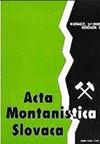Reconsidering measurement of absorptive capacity in the case of knowledge transfer from Nordic to the Baltic countries
IF 1.4
4区 地球科学
Q2 GEOSCIENCES, MULTIDISCIPLINARY
引用次数: 0
Abstract
Knowledge transfer and benefits from spillover are one of the most desirable expectations from FDI and/or collaborations between domestic and foreign capital companies. However, the company may gain knowledge from collaboration if it has abilities properly to use knowledge or technologies that are accessible. The goal of the article is to provide a measurement tool for absorptive capacity. The study focuses on the collaboration between Nordic and Baltic countries. Thus, the targeting companies for research have been chosen as either Nordic capital companies operating in Lithuania and Estonia or domestic companies with an international relationship with Nordic capital companies. The article contributes to the theory of absorptive capacity and to the theory of internalization as well. The construct has been validated, and reliability has been estimated while testing 158 companies. The proposed measurement construct can be instrumental for further research of knowledge transfer from international collaborating companies of different capital origins for the mining industry sector since raw materials industries encounter new performance challenges in the context of the war in Ukraine, which caused a severe energy crisis.重新考虑从北欧到波罗的海国家的知识转移中吸收能力的测量
知识转移和外溢收益是对外国直接投资和(或)国内外资本公司之间合作最理想的期望之一。然而,如果公司有能力正确地使用可访问的知识或技术,那么它可能会从合作中获得知识。本文的目的是提供一种测量吸收能力的工具。这项研究的重点是北欧和波罗的海国家之间的合作。因此,研究的目标公司要么是在立陶宛和爱沙尼亚经营的北欧资本公司,要么是与北欧资本公司有国际关系的国内公司。本文对吸收能力理论和内化理论都有一定的贡献。通过对158家公司的测试,对该结构进行了验证和可靠性评估。由于原材料行业在乌克兰战争的背景下面临新的绩效挑战,导致了严重的能源危机,因此所提出的测量结构可以为进一步研究来自不同资本来源的国际合作公司的知识转移提供工具。
本文章由计算机程序翻译,如有差异,请以英文原文为准。
求助全文
约1分钟内获得全文
求助全文
来源期刊

Acta Montanistica Slovaca
地学-地球科学综合
CiteScore
3.60
自引率
12.50%
发文量
60
审稿时长
30 weeks
期刊介绍:
Acta Montanistica Slovaca publishes high quality articles on basic and applied research in the following fields:
geology and geological survey;
mining;
Earth resources;
underground engineering and geotechnics;
mining mechanization, mining transport, deep hole drilling;
ecotechnology and mineralurgy;
process control, automation and applied informatics in raw materials extraction, utilization and processing;
other similar fields.
Acta Montanistica Slovaca is the only scientific journal of this kind in Central, Eastern and South Eastern Europe.
The submitted manuscripts should contribute significantly to the international literature, even if the focus can be regional. Manuscripts should cite the extant and relevant international literature, should clearly state what the wider contribution is (e.g. a novel discovery, application of a new technique or methodology, application of an existing methodology to a new problem), and should discuss the importance of the work in the international context.
 求助内容:
求助内容: 应助结果提醒方式:
应助结果提醒方式:


